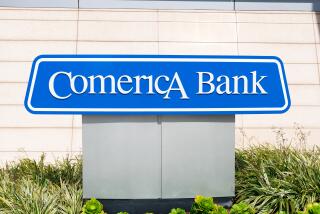IndyMac’s loss much wider than expected
- Share via
IndyMac Bancorp Inc. joined the ranks of mortgage lenders reporting huge third-quarter losses, saying Tuesday that real estate speculators were defaulting on its 100% financing packages and that Wall Street investors were wary of buying its nontraditional loans.
The Pasadena-based lender racked up more than $200 million in losses during the third quarter, five times as much as it had predicted in September. It was the company’s first quarterly loss in nearly a decade.
IndyMac Chief Executive Michael Perry blamed house flippers for most of the losses. Many of these speculators bought properties with little or no money down, often using a “piggyback” loan to cover the down payment, Perry said.
Now with home values falling and with little or no money at stake, these borrowers are defaulting on their mortgages, Perry said. “A lot of speculators crept into the market -- people who lied about their intent to live in their homes,” he said.
The upside, he added, is that these loans quickly went bad and the downturn in housing has now chased away the would-be opportunists, so that problem should subside. IndyMac slashed its quarterly dividend by 50% to 25 cents, and Perry said further reductions were likely if losses continued.
IndyMac shares fell 28 cents, or 2.2%, to $12.49.
The stock price has plunged 72% this year, and IndyMac has become a favorite of short sellers, who borrow stock, sell it and hope to make a profit when the share price declines and they can buy it back at a cheaper price.
As of Oct. 31, 43.2 million shares of IndyMac stock had been sold short, up from 39.3 million shares Oct. 15.
With 80 million shares outstanding, more than half the stock has been shorted. IndyMac, heavily exposed to residential mortgages, has been reshaping itself to concentrate on more conservative loans that government-sponsored mortgage giants Fannie Mae and Freddie Mac will buy.
The company had forecast a loss of zero to 50 cents a share Sept. 7, but Perry said the earlier expectation was demolished by rising loan delinquencies, credit downgrades of mortgage-backed bonds and widespread belief that home prices would continue to fall.
“I think the world has changed a lot in the last two months,” Perry said in an interview, citing the billions of dollars in mortgage-related losses that major Wall Street firms have reported -- sub-prime lending catastrophes that cost the chief executives of Citigroup Inc. and Merrill Lynch & Co. their jobs.
IndyMac pegged its third-quarter deficit at $202.7 million, or $2.77 a share, contrasted with a year-earlier profit of $86.2 million, or $1.19.
IndyMac, a top 10 mortgage lender nationally, as recently as the second quarter had been No. 1 in loans to so-called Alt-A borrowers, typically small-business owners with good credit scores who wrote off their expenses so aggressively that their tax returns showed little income.
The lender made mortgages to those customers without documenting their earnings.
IndyMac also was a big player in interest-only loans and “jumbo” mortgages larger than Fannie Mae and Freddie Mac’s $417,000 limit for loan purchases.
Nonperforming assets, a category that includes loans 90 or more days delinquent and foreclosure properties, rocketed to 2.46% of total assets from 0.51% a year earlier.
Reflecting that ominous trend, IndyMac’s credit costs rose from $15 million in the third quarter of 2006 to $408 million last quarter. The company increased credit reserves by $441 million, or 47%, to $1.39 billion. Production of mortgages tumbled 30% to $16.8 billion. Losses on sale of loans and mortgage-backed securities added $167 million to the deficit before taxes.
IndyMac took a charge of about $28 million to cover severance costs for the elimination of 1,547 positions.
Perry declined to project earnings for the fourth quarter or for 2008, saying uncertainties are too great, and he wouldn’t rule out more layoffs.
Despite the losses, IndyMac said it had plenty of capital and reserves against losses. It said it had $4.9 billion in cash and available credit lines Sept. 30 -- enough to ride out the downturn in the housing market and the continuing mortgage industry shakeout, which Perry said put 170 lenders out of business.
“We have no liquidity issues today, while many mortgage companies have gone bankrupt or recorded massive losses due to liquidity shortfalls,” he said.
Also Tuesday, the largest Korean American bank, Hanmi Financial Corp. of Los Angeles, reported a third-quarter profit of $11.1 million, or 23 cents a share, down 37% from $17.6 million, or 36 cents, a year earlier. Seriously delinquent and foreclosed loans tripled to $45 million, and the bank said its profit margin on lending was constricted by intense competition in its ethnic niche.
Hanmi released its results after the close of the markets. In earlier trading, its shares rose 16 cents to $10.19.
More to Read
Inside the business of entertainment
The Wide Shot brings you news, analysis and insights on everything from streaming wars to production — and what it all means for the future.
You may occasionally receive promotional content from the Los Angeles Times.











